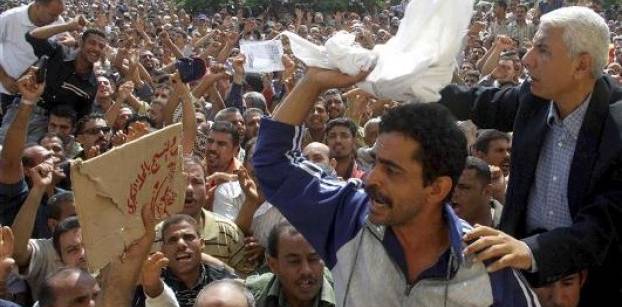HRW urges Egypt to 'unshackle workers' right' to organise

Mahalla textile workers' strike in 2007. REUTERS
CAIRO, May 1 (Aswat Masriya) - As Egypt marks Labour Day, Human Rights Watch has urged the Egyptian government to legalise independent trade unions and “end the decades-old single official union system.”
“Egypt’s government is ignoring the basic right of workers to organize independently,” Human Rights Watch's Middle East and North Africa Deputy Director Nadim Houry was quoted as saying in a statement issued by the U.S.-based watchdog on Saturday under the title, "Egypt: Unshackle Workers' Right to Organize."
“The government seems intent on stifling the freedom Egypt’s labor movement only gained after years of struggle that culminated in the 2011 uprising," he added.
In line with the 1967 Trade Union Law, the Egyptian government does not recognise independent unions, which emerged in 2008 and started to proliferate after the 2011 Uprising.
Only the unions operating under the umbrella of the state-controlled Egyptian Trade Union Federation, established in 1957, are recognised by the government.
The 2011 Uprising, which ended the 30-year-long rule of former president Hosni Mubarak, had heralded some independence for trade unions, according to Human Rights Watch.
In March 2011, then-Manpower Minister Ahmed al-Borai presented “the Declaration of Union Freedoms,” which allowed independent unions to register, and proposed a new draft law on trade unions.
But neither Borai’s draft law nor two other draft laws presented afterwards were adopted, and the 1967 law is still in place.
Human Rights Watch also called on the Egyptian authorities to “allow free and fair elections to union boards for the first time since the country’s 2011 uprising.”
It added that “successive Egyptian governments have not allowed new elections and have kept in place unelected boards appointed by various manpower ministers.”
Egypt's constitution stipulates that the state “shall protect workers’ rights.”
Human Rights Watch said that it received a copy of the latest draft trade union law that the government prepared between 2014 and 2015. “The draft law would end the single union system but restrict organizations’ rights in other ways, such as punishing with prison time those who establish unions without approval.”
But the cabinet was reshuffled and the manpower minister was replaced after the drafting of the law. No final draft has been made public as of yet.
The “partial recognition” that was given to independent unions has now been reversed, according to Human Rights Watch.
“The governments’ and parliaments’ failure to amend restrictive laws made it easy for the authorities to increasingly erode these limited concessions. For example, independent unions that were able to register cannot deduct dues from members’ salaries, and their members have not usually been allowed to serve as workers’ representatives on national councils or in negotiations with business owners.”
A wave of recurrent workers’ strikes, which began in late 2006, shaped the build-up to the 2011 Uprising.
The wave started with a strike in December 2006 by the workers of the Mahalla textile workers.
In April 2008, the Mahallah textile workers had planned another strike to protest the increased cost of living and low wages.
The strike attempt was thwarted, which pushed workers to take to the streets and clash with security forces. Calls for solidarity led to street clashes with police and the birth of the April 6 Youth Movement, one of the groups that electrified the January uprising.









facebook comments